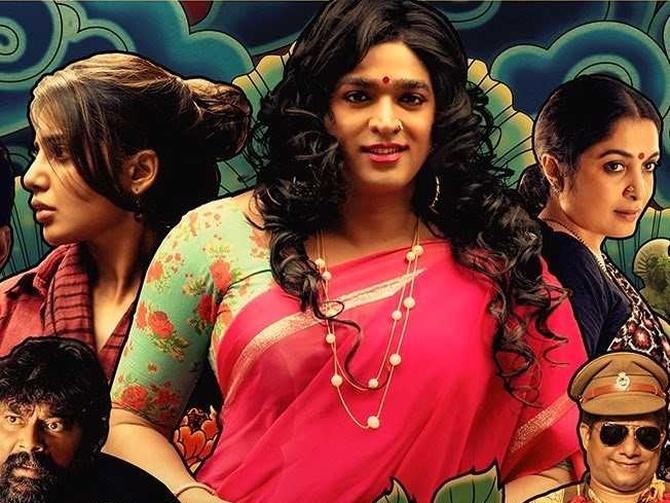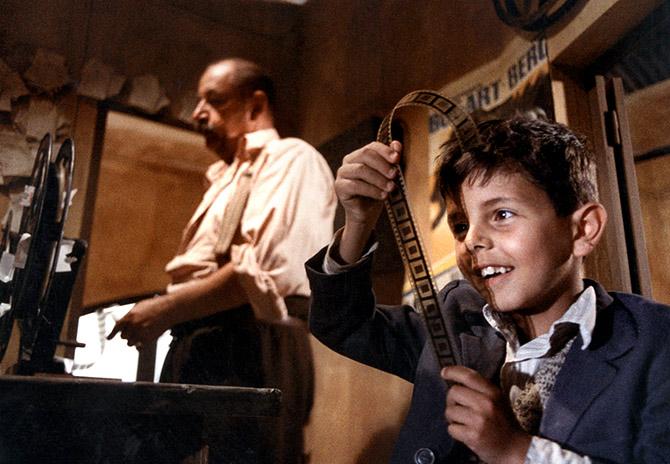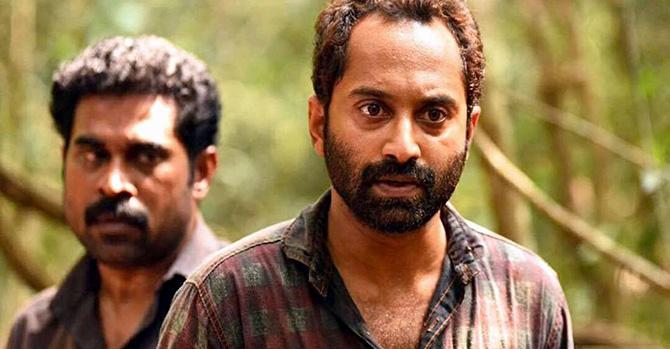'If you can tell the quality of a movie-watching experience, only and only by referring to set standards, you *aren't really* going to the movies,' argues Sreehari Nair.

'You receive a movie through its characters, through the movement of the actors about one another, through how the lines are spoken, through the staging of the scenes, and through the many faint rhythms created in your mind by the director's control over his craft. For starters, there's not a single *good performance* in Super Deluxe,' declares Sreehari Nair.
A debate erupted on Twitter the other day about whether or not Karan Johar's cinema is apt to be called Masala.
Before a clear verdict could be reached on the subject, another question emerged: Is Martin Scorsese's Taxi Driver apt to be called Neo-Noir?
Those who took part in the debate, then, spent most of their evening trying to match the elements in Taxi Driver and in Johar's films to the pre-established conventions of Neo-Noir and Masala Cinema respectively.
Since I believe that our typical Masala fare,rendered without subversion, is a dead horse which we are trying to flog, and because I have no particular attachment for Johar's cinema, I thought of pursing an unpopular line with the debaters: Ask, if any of them felt any connection to Taxi Driver's central theme of a man desperately looking for a way into society.
I repeated my question in my head, and could pre-empt the reactions: A list of films about Urban Alienation followed by a discussion on whether Taxi Driver does, or does not, belong to this group.
Twitter may be a nuthouse, but as far as nuthouses go, it's a great place in which to investigate our New Paranoias.
And a disturbing cultural paranoia, up for investigation, is this placid, academic dissection of cinema where most of one's critical energy gets spent on imposing theories and formulas to movies, and organising them into neat categories, genres, and boxes.
When consumed by this paranoia, the last thing one does is respond to movies.
Sad as it feels when Twitteratis participate in this Fake Objectivity Parade, it's tragic when established film writers start considering it their duty to toe the same line.
A very senior film critic built his entire review of Thiagarajan Kumararaja's Super Deluxe on the premise that the film is one of the many recent works whose narratives 'happen in a single day or two'.
Names were cited, lances were drawn, and a theory was hit upon: About how this compressed time frame approach aids the dethroning of all the supposed evils of our age (Which, as you might have guessed, is 'Patriarchy' and everything that springs from it).
You only have to glance over the aforesaid review to deduce that the critic in question is, despite his special affinity for the word 'cinematic,' merely reacting to the outward cleverness of Super Deluxe's plot mechanics, and not telling us how, as a viewer,he received the movie.
If there's anything that a genuine love for cinema will teach you, it's that ingenious plot movements don't guarantee that a movie won't be unsavory; and that memorable movies very often come out of simple, banal sounding plots.
In truth, you receive a movie through its characters, through the movement of the actors about one another, through how the lines are spoken, through the staging of the scenes, and through the many faint rhythms created in your mind by the director's control over his craft.
As I see it, there's not a single good performance in Super Deluxe (Nobody 'behaves' in Tamil cinema, as it is).
There's not a single shot in the movie that transcends this Post-Pulp-Fiction aesthetic of crowding movie narratives with touches of irony and random interlockings.
The characters are barely alive: It is, as though, they are waiting for the moments of irony to arrive and cut their legs off.
Dotting your script with paradoxes isn't enough if the horny kids in your movie seem like they are play-acting horniness; if your lovers don't seem, in the least bit, committed to the act of lovemaking; if there's no subtle logic to the bitchiness of your extras; and if your actress seems like she is reading 'dirty talk' out of a manual.
As a viewer, you wouldn't notice these things, of course, if your *only* endeavour is to decoct from Super Deluxe a 'thesis,' or tell everyone how much the movie reminded you of the writings of Max Weber.
What is genuinely funny about this theoretician-of-a-critic's review of Super Deluxe is that his detached, educated responses -- whipped out as afterthoughts -- give lie to his own theory that 'the stories in the film are of the here and now'.
(It's as if the critic 'wasn't there' when the movie happened). This irony, though, is fitting for a movie that talks about the chaotic nature of the universe, but nothing in which feels 'free' or 'alive.'

SO HOW DID WE GET HERE? A philosopher's question. Also a curious sociologist's.
Oddly enough, the decline of Direct Response and the growth of Educated Response to movies, can, I believe, be linked to the Rise of the Cinephile -- and the subsequent explosion of the Listicle Culture.
Now I am not putting down Listicles here: I don't know anybody who doesn't enjoy them, more or less, at some time or other.
One, however, senses a niggling in one's spleen, when the spirit of the Listicle Culture starts invading the field of serious film criticism.
Databasing and Categorising of movies, with its dependence on your intellectual side alone, is a markedly different art from critiquing a movie which requires the whole of you to react at once.
Most of these educated dissectors are smart people, but their smartness, in a way, becomes a deterrent to them responding fully to movies -- for they trust *only* the intellectual side of their responses, and *do not trust* the Authority of their Senses.
A cinephile walks into a movie.
Watches a scene in which a one-legged man is mocked at.
The cinephile laughs -- then steps out of the theatre and intones, 'The joke was in bad taste.'
Here's the deal.
You may not, as a rule, enjoy the disabled being made fun of. But because movies have a way of getting around our cleverness and our set responses, you owe it to the medium to not scorn at that joke in hindsight, but discover what in it pushed you to react beyond the boundaries of good taste -- the reason could be anything from a personal experience it evoked, to the uniqueness of the camera choreography, or simply the timing of the actors involved.

'This tendency to pardon mediocrity because it draws on past mediocrities is not just the laziest way to analyse movies; it's also the tendency that stops you from giving works with some fresh feeling in them, works which spell the health of the movies, their real due,' declares Sreehari Nair.
As an anatomiser of movie euphoria, you help the medium only if you bring to your analysis, enormous subjectivity, and a precise recording of 'What it feels like to watch a movie.' And a theory -- whether technical or ideological -- frequently gets in the way of you parsing your own feelings.
Theories become templates which you then push onto a movie to see if it pops through the right holes: 'If it pops, the movie is good; if it doesn't, it is bad.'
When you have one eye cocked always in the direction of the past, hark-backer-like, what you invariably end up *not judging* is the actual quality of the experience.
Cinema watching is then turned into a game of Jeopardy -- a game where you give someone the answer to a question and they then have to give you the question.
In Cinema Watching's equivalent of Jeopardy, trite and formulaic plot-pointers are offered as answers, and you are expected to guess the Genre in order to complete the game.
'Mr K, how do you account for the gross inconsistencies in character development, in Zoya Akhtar's Gully Boy?
'I saw Ranveer Singh go from being 'extremely low on self-esteem' to 'bright-eyed and bushy-tailed' over successive frames -- all so that the demands of the plot could be fulfilled.'
'You have no respect for the Underdog Story as a movie genre, do you?'
'How do you explain that girl from Berkley who comes to Mumbai on a vacation, and who then goes around defacing the city's infrastructure?'
'The Berkley Girl is Outrage, Externalised -- a super important element of the Underdog Story. Without rage, there can be no Triumph of the Underdog.'
'But isn't the Rap Music scene in India all about small fries trying to go one up on each other? Who, then, is this Uber-Underdog we are supposed to have special affection for?'
'Listen man... what has an Underdog done to you? Also, Rocky, you no problem with, right? The Karate Kid, you adore? Why can you just let the Indian Underdog have his day?'
This tendency to pardon mediocrity because it draws on past mediocrities is not just the laziest way to analyse movies; it's also the tendency that stops you from giving works with some fresh feeling in them, works which spell the health of the movies, their real due.
It's because academicians tend to be afraid of works that don't fit their standards that they have such a poor record with those rare movies which try to move you in interesting, new ways.
Some of the analyses are sweet tonics for depression.
Sriram Raghavan's Badlapur was incinerated for being a 'routine revenge drama' with an 'uninspiring second half'.
A 'simple, slice-of-life film' was the general consensus on Dileesh Pothan's Maheshinte Prathikaram.

'The misplaced belief at the centre of all this is that you are good to talk about films only if you are a film aesthete.'
'Who's to say that personal setbacks, making love, caring for a sick child, waiting at the supermarket counter, seeing a new place aren't important to developing your response to movies?'
'A good heartbreak can teach you more about movies than movies!' declares Sreehari Nair.
Shoojit Sircar's October was judged to be no more than 'a tale of eternal love'. And Shanker Raman's Gurgaon was set aside as 'a distant noir'.
Such entirely intellectual, genre-based responses have their source, majorly, in this misplaced belief that you are good to talk about films only if you are a film aesthete -- that, the foolproof method to becoming a movie critic is to cram yourself with as many movies as possible.
As much as you need knowledge of cinema history, if your responses to movies are based purely on the movies you have watched, what you would end up with is an absurdly distorted view of cinema.
Cinema being the pop form that it is requires you to have a good enough understanding of the other arts. I can vouch for the fact that you need to be at least as well-read (and by this, I don't mean books on Cinema) as you are a movie buff.
But most importantly, it would help a great deal if you have lived a life; and have respect for all the supreme juices of life.
Who's to say that personal setbacks, making love, caring for a sick child, waiting at the supermarket counter, seeing a new place, eavesdropping on the small talk in local trains, aren't important to developing your response to movies?
God, a good heartbreak can sometimes teach you more about movies than movies!
It may be a little unfashionable to say this, but your responses to movies would be sharper if you are at least as practical-minded as you are a poet.
It's when you go looking for what motion pictures have in them that is 'exclusive' that you get to such monstrosities as a recent newspaper story where a Shipwreck was described as a 'Real Life Titanic'!
Film Aestheticism, which was one of the many reactions to Cultural Philistinism, is, today, a phenomenon characterised by aesthetes confining themselves to a self-created box which doesn't let in Life.
The academic grotesqueries that a cinephile might be willing to commit, in order to differentiate herself from the Philistia, is why you may discern an incomparable degree of truth in the remark of someone who says 'I liked Gully Boy, because Alia Bhatt's eyelashes reminded me of my ex-girlfriend.'
A direct response to movies isn't just one of the great gifts bestowed upon us by movies; it's also a social need of our times.
There's a deadness that forms over one's psyche when relentlessly assaulted by canned speeches, false projections, and the polarising nature of our political discourses.
Politics gives the disease; but when we don't seek its cure in the arts, we are only reinforcing the problem.
A politician who doesn't 'react to the given' and has 'his thoughts prepared in advance' isn't in the pursuit of making history; he's merely trying to distract himself from the history being made.
Likewise, if you can tell the quality of a movie-watching experience, only and only by referring to set standards, you *aren't really* going to the movies.











 © 2025
© 2025